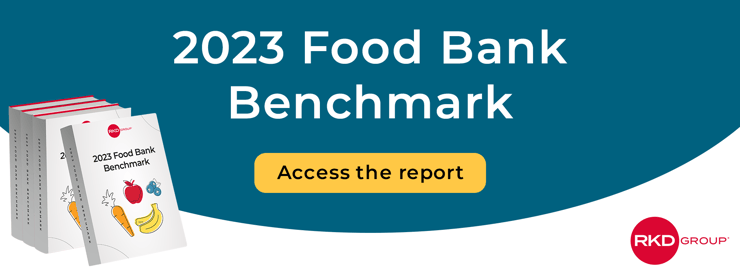RKD’s 2023 Food Bank Benchmarks are in.
As I reviewed, a few points stood out to me:
- Despite 2020 and 2021 being significant performance outliers, results in 2022 were still significantly higher than 2019 pre-pandemic levels.
- Donors gave 19% more frequently in 2022 than in 2019. Much of this is due to an emphasis in the acquisition of monthly sustainers over the last few years.
- Retention is softening across all lifecycles—which is largely due to the huge volume of donors that were brought onto files in 2020 and 2021.
There are many other important findings, and I encourage you to check out the full 2023 Food Bank Benchmark report here.
As a result of these takeaways, we’re molding our food bank strategies to focus on critical aspects like core donor retention, digital advancement, lapsed reactivation and much more. Here’s a breakdown of a few areas your food bank should emphasize as we move deeper into 2023:
1. Focus on dynamic, omnichannel donor journeys.
The biggest area of focus for our food bank partners in 2023 will be smarter donor journeys that are segmented by lifecycle.
To do this, food banks will need to develop lifecycle communication plans that deliver meaningful experiences through touchpoints across channels. We must move donors through stages of solicitation, appreciation, re-engagement and stewardship.
If you’re interested in learning more about this, my colleague Eddy Camas recently wrote a great blog on building smarter donor journeys here.
2. Continue to expand investment in digital.
Digital investment is critical. If you haven’t already expanded your investment in the channel, now is the time to do so. Food banks who invested less in digital last year saw a sharper decline in revenue than those who upped their digital budgets. This happened for a couple of reasons:
First, many of the donors acquired in 2020 and 2021 came through digital channels–and are much more likely to stick around after receiving digitally-driven campaigns.
Second, food banks who increased their investment in digital media were able to use it as a tool not only to acquire new donors, but also to stay top of mind with current donors throughout their journeys.
As we work with our clients in 2023, we’re helping them optimize their budgets so they have the right balance of investment between direct mail and digital.
3. Pay extra attention to core donors.
Core donors are the single most important group on your file. They have given to you two consecutive years or more and are the most likely candidates to upgrade to mid and major giving.
Many of the donors whom food banks acquired in 2020 and 2021 are now moving into the second and third years of their core donor journey. Because of this, we need to focus on identifying the ones who have the potential to lapse and creating customized experiences for them. Higher-dollar core donors should be receiving things like high-touch packages and phone calls, and lower-dollar core donors should receive things like impact reports and post cards.
In all cases, we must look for ways to move beyond transactions and strengthen the relationships with these donors.
4. Add additional efforts for your lapsed audience.
Speaking of lapsed audiences, we’ll want to ensure there are targeted efforts to bring them back onto the file and improve retention numbers.
The reality is most donors don’t realize they’ve lapsed. To get their attention and help reactivate these donors, we’re focusing on creative tests, putting them back into acquisition with involvement devices, testing ask strings and more.
2023 will be a critical year for food banks in securing their long-term success. By strategically investing in areas like digital, retention and core, food banks can avoid returning to pre-pandemic fundraising levels and focus on supporting the growing need in their communities.






Leave a comment: